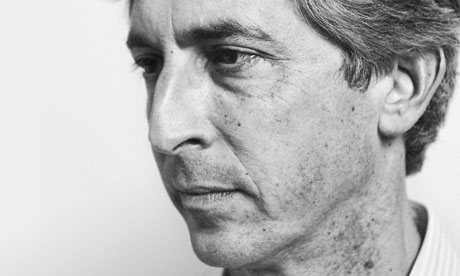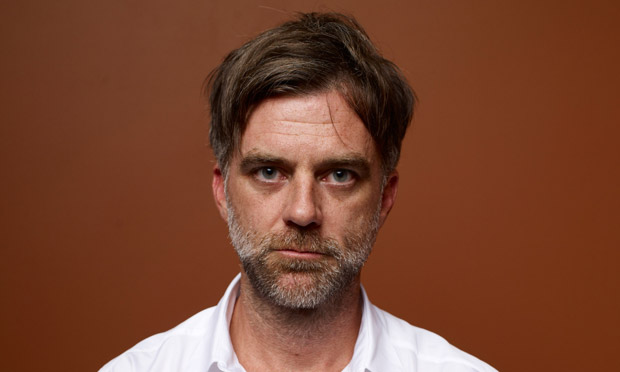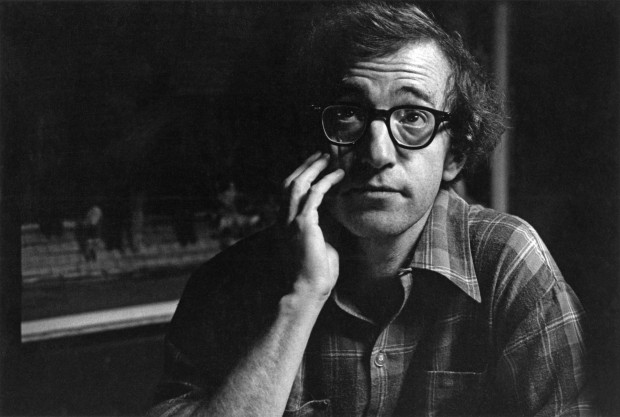Before I begin my countdown, here are 20 honourable mentions (in alphabetical order)—directors whose work is extremely worthwhile, but who fell short of my top 10:
* Pedro Almodóvar
* Noah Baumbach
* John Cassavetes
* Sofia Coppola
* Wes Craven
* Alfonso Cuarón
* Clint Eastwood
* William Friedkin
* Jim Jarmusch
* Krzysztof Kieślowski
* Richard Linklater
* Terrence Malick
* Sam Mendes
* Roman Polanski
* Michael Powell
* Rob Reiner
* Martin Scorsese
* Andrei Tarkovsky
* François Truffaut
* Lars von Trier
10. Steve McQueen

Why I love him: McQueen has only made three feature films—Hunger, Shame and 12 Years a Slave. I have only seen the first two, but those were enough to convince me that this man is something extraordinary. McQueen's background in art and design means that his films are visual feasts. He knows how to create mood, and he can destroy you with a single image. He understands that sad stories don't need to be sensationalised. In other hands, his films would be hokey tear-jerkers, but McQueen knows how to subtly convey human tragedy. At only 43 years of age, this man has the potential to go down as one of the greatest directors who ever lived.
Top two films:
2. Hunger (2008)
1. Shame (2011)
The master at work:
9. Alexander Payne

Why I love him: You may recall that my favourite film genre is the dramedy (drama + comedy). I believe few writer-directors have mastered this genre as well as Alexander Payne. Payne earns his spot as my ninth favourite director because he is wonderful at developing characters. His characters are never archetypal or stereotypical. They have virtues and flaws, and you spend most of the film trying to figure out whether or not you like someone. His films are rarely laugh-out-loud funny. They're funny in the way the people in your life are funny. When you talk to your friends, there is no camera on any of you. You make each other laugh, but you're never performing. It's organic joviality. Payne is an expert at conveying pathos. There's a scene in Sideways where Paul Giamatti's character describes the Pinot Noir grape to a woman he has romantic feelings for (Virginia Madsen). If you listen closely, you'll notice he's not only talking about the grape; he's describing himself, too.
Top three films:
3. Election (1999)
2. The Descendants (2011)
1. Sideways (2004)
The master at work:
8. Paul Thomas Anderson

Why I love him: The first word that pops into my mind when I hear the name 'Paul Thomas Anderson' is "immersive". His films pull you into a unique world, or lure you into a particular disposition. I believe he is incapable of making a bad film. Hard Eight is the only Anderson film I haven't seen. Everything else—Boogie Nights, Magnolia, Punch-Drunk Love, There Will Be Blood and The Master—ranges from quite good to brilliant. He is skilled at getting stellar performances out of his actors. Adam Sandler hit a level we had never seen from him before in Punch-Drunk Love. Daniel Day-Lewis and Joaquin Phoenix gave powerhouse performances in There Will Be Blood and The Master, respectively. Anderson is a precocious talent who has achieved more in 17 years than most directors achieve in a lifetime.
Top three films:
3. There Will Be Blood (2007)
2. Magnolia (1999)
1. Boogie Nights (1997)
The master at work:
7. Woody Allen

Why I love him: Where do I begin? Here is a man who makes one film per year because he's afraid inaction will kill him. He has a very pragmatic approach to filmmaking. He doesn't strive to make good pictures. He shoots scenes depending on what is easiest, not what is best from an artistic standpoint. He hates change and unfamiliar surroundings. He CAN'T STAND the country (especially at night). He doesn't watch his own films and believes awards are meaningless because we will all be dead one day. He doesn't give many instructions to his cast and crew, and has a reputation for being one of the most laid-back directors of all time. He loves New York City more than you love anything. He's made several average-to-bad films, but he's made just enough outstanding ones to earn a place on this list and in my heart.
Top three films:
3. Match Point (2005)
2. Annie Hall (1977)
1. Hannah and Her Sisters (1986)
The master at work:
6. David Fincher

Why I love him: It's very difficult to write about David Fincher because he doesn't have the consistency that other directors do with themes and style. He moves from film to film and seems to reinvent himself with each one. Generally speaking, he is fond of dark colour tones and he often constructs universes where cynicism reigns supreme. What's interesting about Fincher is how he can appease both mainstream film audiences and arthouse enthusiasts. His films are made with a beautiful balance of work and play. They're never too cerebral and never superficial.
Top three films:
3. Se7en (1995)
2. The Social Network (2010)
1. The Curious Case of Benjamin Button (2008)
The master at work (CONTAINS SPOILERS):





5. Michael Haneke

Why I love him: In my opinion, Haneke understands the dark impulses of humanity better than any director working today. He does not shy away from making an audience uncomfortable, and I would guess that he even gets a kick out of it. Haneke's Funny Games (1997) is still the most disturbing film I have ever seen. It made me feel hopeless and nasty. Haneke believes American cinema is responsible for the "dis-empowerment of the spectator," which is perhaps why his films are so involving. He is known for including long gaps of silence in his films. These may sound like tranquil reprieves on the surface, but they only make the viewing experience more unsettling. I have found myself saying "I can't believe he went there..." when watching Haneke's films, so I have learnt to abandon all expectations. A Haneke film is one of the most exciting, unpredictable things you can experience in this world. This man goes where others fear to tread.
Top three films:
3. Funny Games (1997)
2. The Seventh Continent (1989)
1. Caché (Hidden) (2005)
The master at work:
4. David Lynch

Why I love him: Lynch is all about blurring the line between fantasy and reality. He is about dreams and nightmares. He exposes the murkiness beneath all things that are seemingly idyllic. To call him a director does not do him justice. He is a Creative Person. Other than film, he dabbles in music and the visual arts. Of course, he is also responsible for the TV show Twin Peaks. Lynch's films are designed to stay with you. They will haunt your mind when you're in the shower, stuck in traffic, or waiting in line at the grocery store one week later. The film that best realises his artistic vision is 2006's Inland Empire, one of the most frightening films ever made. It's not my favourite, though. That distinction goes to the hauntingly beautiful Mulholland Drive, a film that will have you scratching your head until your scalp bleeds. Everyone needs some Lynch in their life. You may not like it, but I can almost guarantee you won't hate it. One last suggestion: watch his films at night, preferably after midnight.
Top three films (not definitive; I find it really tough to rank his films):
3. Eraserhead (1977)
2. Blue Velvet (1986)
1. Mulholland Dr. (2001)
The master at work:
3. Stanley Kubrick

Why I love him: This man was all about perfectionism. Rumour has it that Kubrick took 127 takes of the baseball bat scene in The Shining. This is denied by Steadicam operator Garrett Brown and assistant editor Gordon Stainforth. However, Brown says the scene where Hallorann explains to Danny what "shining" is was shot 148 times, which would make it a world record. Kubrick was a sucker for symmetry. His hallway scenes were always entrancing, and his set design was endlessly exquisite. He did a lot of genre-hopping in his time. He made some war films (such as Paths of Glory and Full Metal Jacket), a horror film (The Shining). a groundbreaking science-fiction film (2001: A Space Odyssey), an epic historical drama (Spartacus), a period piece (Barry Lyndon), a black comedy (Dr. Strangelove), and an erotic mystery-thriller (Eyes Wide Shut), among other concoctions. His influence on the field is indescribable, and he produced one of the most consistent bodies of work of any director who has ever lived. I believe he was the first person who I called "my favourite director". He has since slipped down to position no. 3, but I will always love him for his contributions to cinema, especially for The Shining—one of the first films to make me realise how exciting it is to be scared by moving pictures.
Top three films:
3. A Clockwork Orange (1971)
2. Eyes Wide Shut (1999)
1. The Shining (1980)
The master at work:
2. Alfred Hitchcock

Why I love him: If you've never seen a Hitchcock film, stop reading this post immediately. I want you to go and watch Rear Window right now. I don't care how you obtain it. Just watch it (then come back and read the rest of this post). The Master of Suspense clocks in at no. 2 on this list because I'm yet to see a film of his that I haven't liked. That's pretty great going, considering I've seen 10 of his films. If you're a regular reader of my blog, you'd have read this before, but it bears repeating: Hitchcock once made a distinction between surprise and suspense. Surprise is when a bomb goes off under a table. Suspense is knowing a bomb will go off under a table, but not knowing when. In Hitchcock's films, the proverbial bomb was always under the table, and we never knew when it would explode. He had an impeccable understanding of how to pace a film so as to involve an audience. The action always unfolded at the perfect speed—not slow enough to bore you, and not fast enough to befuddle or encourage anticlimax. As creepy as his films often were, he always softened the intensity with comic relief. The man knew how to write snappy dialogue. Consider this line from Vertigo: "Only one is a wanderer; two together are always going somewhere." He has had an immense impact on popular culture, and I think it will be a long while until we see another director who fascinates the general public as intensely. Alfred Hitchcock is one of those directors whom even casual filmgoers can name off the tops of their heads.
Top three films:
3. Vertigo (1958)
2. Psycho (1960)
1. Rear Window (1954)
The master at work:
1. Ingmar Bergman

Why I love him: It saddens me that so many people—even film-savvy people—don't really know much about Bergman. They've heard the name a million times, but they can't put a face to it, and they might name two of his films if they're lucky. Then I remember that I was that person until last year. The reason Bergman isn't talked about as much as he should be is because he was a recluse. He saw making films as a pastime...as catharsis. The Swede is known for his grim subject matter such as death, loneliness, betrayal and insanity, and these dark themes turn a lot of people off his films. I consider his exploration of these themes quite liberating, myself. He had a way of phrasing things I have always felt but have never known how to express. I'm surprised he wasn't a psychologist in his spare time. There is an honesty in his dialogue that is delicately painful. I have noticed a series of what I call "Bergmanesque insults" which characterise his films. A textbook example is "Your callousness is perverse" from Through a Glass Darkly. There are no obligatory niceties or fancy turns of phrase. That is a strong, direct insult that cuts deep in the psyche of whomever it is aimed at. Bergman became my favourite director after I watched Winter Light in April earlier this year. That was very apt, considering Bergman once said, "I think I have made just one picture that I really like, and that is Winter Light." Every frame in a Bergman film is crafted with loving expertise, thanks largely to the skilled camerawork of Sven Nykvist. Any primitives who say "Black and white films are boring" should watch a Bergman film and see the way he works with light. Bergman worked closely with actresses Harriet Andersson, Liv Ullmann, Bibi Andersson, and Ingrid Thulin. These women were his muses, and he could draw phenomenal performances from them with very little effort. Bergman believed that the close-up of a human face was the height of cinematography. He was fascinated with faces and I would pay to listen in on a conversation between him and John Cassavetes about the power of the human face in conveying information. Lastly, if you haven't read this Bergman quote before, you're in for something special:
"Film as dream, film as music. No form of art goes beyond ordinary consciousness as film does, straight to our emotions, deep into the twilight room of the soul. A little twitch in our optic nerve, a shock effect: twenty-four illuminated frames in a second, darkness in between, the optic nerve incapable of registering darkness. At the editing table, when I run the strip of film through, frame by frame, I still feel that dizzy sense of magic of my childhood: in the darkness of the wardrobe, I slowly wind one frame after another, see almost imperceptible changes, wind faster — a movement."
Top three films:
3. Wild Strawberries (1957)
2. Winter Light (1963)
1. Fanny and Alexander (1982)
The master at work:
Excellent list. I love all of those guys, and I'm so happy to see that we share the same favorite director. Bergman is my god.
ReplyDelete